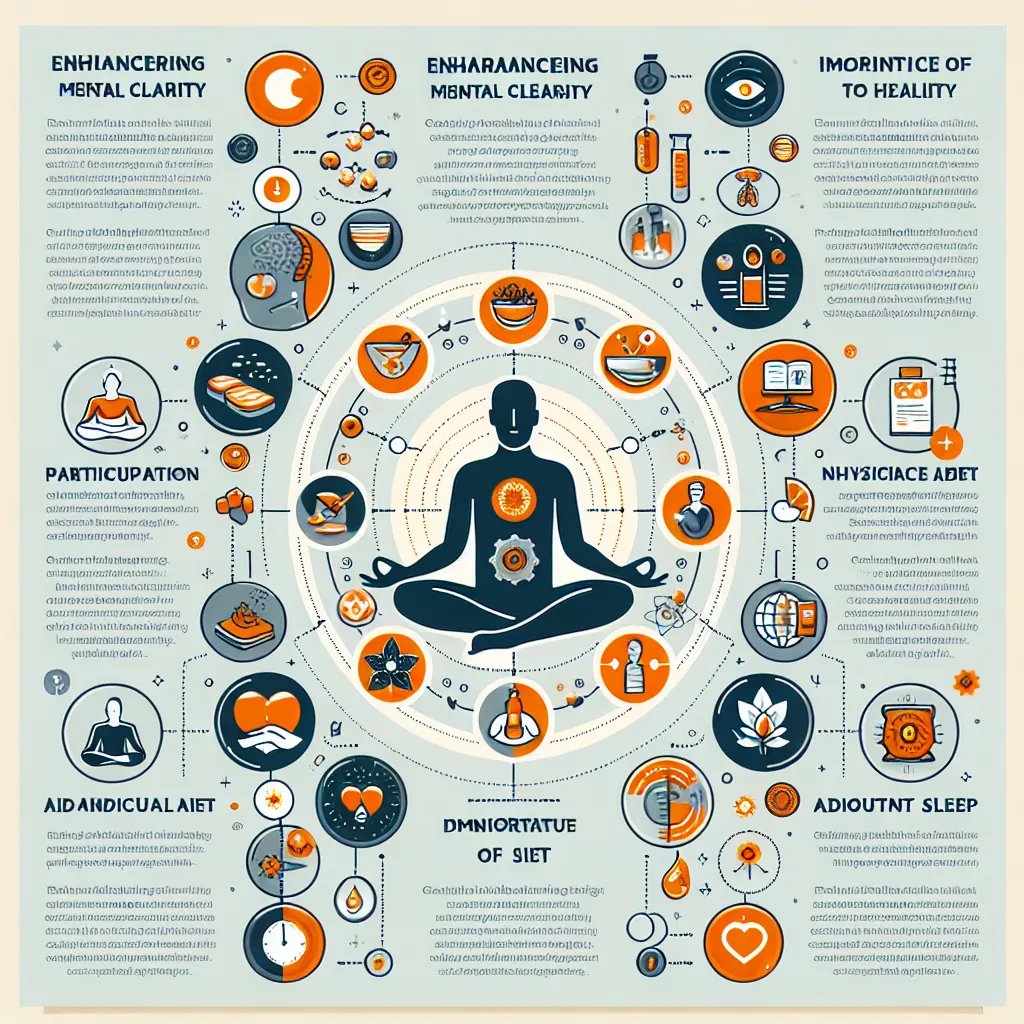The IELTS Reading section is a crucial component of the test, requiring candidates to demonstrate their ability to understand and analyze complex texts. One topic that has gained prominence in recent years is mental clarity – a subject that intersects with cognitive science, psychology, and personal development. Based on trends in IELTS exams and the growing interest in mental health, it’s likely that passages related to improving mental clarity may appear in future tests. Let’s explore this topic through a practice reading exercise tailored to IELTS standards.
Nội dung bài viết
 Mental Clarity Infographic
Mental Clarity Infographic
Reading Passage
Enhancing Mental Clarity: Strategies for a Sharper Mind
In today’s fast-paced world, maintaining mental clarity has become increasingly challenging. The constant barrage of information, coupled with the demands of modern life, can leave many feeling mentally foggy and unfocused. However, research suggests that there are effective strategies for enhancing cognitive function and achieving greater mental clarity.
One of the most powerful tools for improving mental clarity is mindfulness meditation. This practice involves focusing one’s attention on the present moment, often through techniques such as deep breathing or body scanning. Studies have shown that regular meditation can lead to increased gray matter density in brain regions associated with learning, memory, and emotional regulation. Moreover, mindfulness has been linked to reduced stress and anxiety, which are often culprits in mental fog.
Physical exercise is another crucial factor in maintaining cognitive sharpness. Aerobic activities, in particular, have been found to boost blood flow to the brain, promoting the growth of new neural connections. Regular exercise has also been associated with improved memory, faster processing speeds, and enhanced problem-solving abilities. Even short bouts of activity, such as a brisk 10-minute walk, can have immediate positive effects on mental performance.
Diet plays a significant role in brain health and mental clarity. Foods rich in omega-3 fatty acids, such as fatty fish, walnuts, and flaxseeds, are essential for maintaining the structural integrity of brain cells. Antioxidant-rich fruits and vegetables protect the brain from oxidative stress, while complex carbohydrates provide a steady source of energy for optimal cognitive function. Conversely, excessive sugar and processed foods have been linked to cognitive decline and decreased mental clarity.
Sleep is perhaps the most underrated factor in maintaining mental sharpness. During sleep, the brain consolidates memories, processes information, and clears out toxins that accumulate during waking hours. Chronic sleep deprivation has been linked to a host of cognitive issues, including decreased attention span, impaired decision-making, and reduced creativity. Establishing a consistent sleep schedule and creating a relaxing bedtime routine can significantly improve the quality and quantity of sleep, leading to enhanced mental clarity during waking hours.
In recent years, cognitive training exercises have gained popularity as a means of sharpening mental acuity. These may include puzzles, memory games, or specialized brain-training apps. While the long-term benefits of such exercises are still being studied, some research suggests that they can improve specific cognitive skills, particularly when combined with other lifestyle factors that support brain health.
Reducing digital distractions is another key strategy for improving mental clarity. The constant notifications and information overload from smartphones and social media can fragment attention and lead to mental fatigue. Implementing digital detoxes, setting boundaries on technology use, and practicing single-tasking instead of multitasking can help restore focus and mental energy.
Lastly, social connections play a vital role in maintaining cognitive health. Engaging in meaningful conversations, participating in group activities, and maintaining strong relationships provide mental stimulation and emotional support. Social isolation, on the other hand, has been linked to cognitive decline and an increased risk of mental health issues.
Improving mental clarity is not a one-size-fits-all endeavor. It requires a holistic approach that addresses various aspects of lifestyle and daily habits. By incorporating strategies such as mindfulness, exercise, proper nutrition, adequate sleep, and meaningful social interactions, individuals can cultivate a sharper, more focused mind capable of navigating the complexities of modern life with greater ease and clarity.
Questions
True/False/Not Given
- Mindfulness meditation has been shown to increase gray matter density in certain brain regions.
- Short periods of exercise have no immediate effect on mental performance.
- Omega-3 fatty acids are important for maintaining brain cell structure.
- Cognitive training exercises have conclusively proven long-term benefits for mental clarity.
- Social isolation has no impact on cognitive health.
Multiple Choice
-
Which of the following is NOT mentioned as a benefit of regular exercise?
A) Improved memory
B) Faster processing speeds
C) Enhanced problem-solving abilities
D) Increased muscle mass -
According to the passage, which of the following is essential for optimal cognitive function?
A) Saturated fats
B) Complex carbohydrates
C) Simple sugars
D) Processed foods
Matching Headings
Match the following headings to the appropriate paragraphs in the passage:
- The Role of Diet in Cognitive Function
- The Importance of Social Connections
- The Impact of Physical Activity on Mental Clarity
- Managing Digital Distractions for Better Focus
Short Answer Questions
-
What specific type of exercise is mentioned as being particularly beneficial for boosting blood flow to the brain? (No more than 2 words)
-
Name two activities that the brain performs during sleep. (No more than 6 words)
-
What is suggested as a method to improve sleep quality? (No more than 5 words)
Answer Key and Explanations
-
True – The passage states, “Studies have shown that regular meditation can lead to increased gray matter density in brain regions associated with learning, memory, and emotional regulation.”
-
False – The text mentions, “Even short bouts of activity, such as a brisk 10-minute walk, can have immediate positive effects on mental performance.”
-
True – The passage indicates, “Foods rich in omega-3 fatty acids, such as fatty fish, walnuts, and flaxseeds, are essential for maintaining the structural integrity of brain cells.”
-
Not Given – The passage states that the long-term benefits are still being studied and does not conclusively prove their effectiveness.
-
False – The text clearly states, “Social isolation, on the other hand, has been linked to cognitive decline and an increased risk of mental health issues.”
-
D – Increased muscle mass is not mentioned as a benefit of exercise for mental clarity in the passage.
-
B – The passage states, “complex carbohydrates provide a steady source of energy for optimal cognitive function.”
-
Paragraph 4
-
Paragraph 8
-
Paragraph 3
-
Paragraph 7
-
Aerobic activities
-
Consolidates memories, processes information, clears toxins
-
Creating a relaxing bedtime routine
Common Mistakes
When tackling IELTS Reading questions like these, candidates often make the following mistakes:
-
Misinterpreting True/False/Not Given questions: Remember, “Not Given” means the information is neither confirmed nor denied in the text.
-
Overlooking key words in Multiple Choice questions: Always read all options carefully before selecting an answer.
-
Rushing through Matching Headings: Take time to understand the main idea of each paragraph before matching it with a heading.
-
Exceeding word limits in Short Answer questions: Stick strictly to the word limit given.
-
Inserting personal knowledge: Base your answers solely on the information provided in the passage.
Vocabulary
- Barrage (noun): /bəˈrɑːʒ/ – an overwhelming quantity or burst
- Culprits (noun): /ˈkʌlprɪts/ – the causes of a problem or difficulty
- Cognitive (adjective): /ˈkɒɡnətɪv/ – related to the mental processes of perception, memory, judgment, and reasoning
- Antioxidant (noun): /æntiˈɒksɪdənt/ – a substance that inhibits oxidation, especially one used to counteract the deterioration of stored food products
- Consolidate (verb): /kənˈsɒlɪdeɪt/ – to combine into a single more effective or coherent whole
Grammar Focus
Pay attention to the use of present perfect tense in scientific contexts:
“Studies have shown that regular meditation can lead to increased gray matter density.”
This tense is often used to describe research findings that are still relevant. The structure is:
Subject + have/has + past participle
Example: Researchers have discovered a link between sleep quality and mental clarity.
Tips for IELTS Reading Success
-
Practice active reading: Engage with the text by underlining key points and making mental summaries as you read.
-
Improve your time management: Allocate your time wisely among the three sections of the Reading test.
-
Expand your vocabulary: Regularly learn new words and their contexts to improve comprehension.
-
Develop skimming and scanning techniques: These skills are crucial for quickly locating specific information.
-
Read widely: Expose yourself to various topics and writing styles to prepare for the diverse passages in the IELTS Reading test.
By applying these strategies and regularly practicing with passages like the one above, you can significantly improve your performance in the IELTS Reading section. Remember, mental clarity isn’t just a topic for reading comprehension—it’s a skill that can enhance your overall test performance and academic success.
For more tips on improving your IELTS performance, check out our guides on effective communication strategies and self-improvement techniques. Additionally, learn about protecting your mental health to ensure you’re in the best state of mind for your IELTS preparation and exam day.


